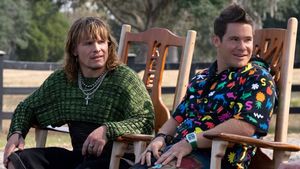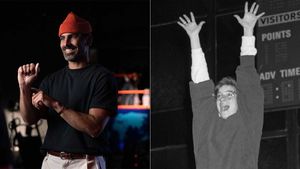If there’s one actor who has a vice grip on our hearts at the moment, it’s Colman Domingo, and with his latest work, Sing Sing, he won’t be letting go anytime soon.
The film, which is based on a true story and features performances from several of its subjects, follows John “Divine G” Whitfield, a man incarcerated for a crime he didn’t commit, within the walls of the infamous New York federal prison from which Sing Sing gets its title. Rather than becoming bitter, Divine G helps found Rehabilitation Through the Arts, also known as RTA, through which inmates put on plays for their fellow incarcerated men.
Before the screening, director Greg Kwedar stepped on stage to introduce the work and became emotional when he took a moment to acknowledge some of the cast for whom this story was their lived experience. He was then joined by Domingo, who spoke passionately about the film. It was shot in just 18 days between The Color Purple and Rustin, Domingo shared. “I make those movies so that I can make movies like this,” he acknowledged.
That’s a bold statement and one that Sing Sing thankfully largely delivers on.
The film opens with Colman in full thespian mode, delivering a soliloquy with all the grace and gravitas you would expect. From there, we follow him backstage where he celebrates the pure joy of performance with his cast mates. It’s warm, it’s familiar, it’s human. We then cut to the cold and winding institutional halls of the prison. Reduced to silent numbers, the men line up while a guard shouts at them. With this stark and shocking juxtaposition, the film quickly makes its case for why RTA is so life-changing for the men who join its ranks.
This is the last time we see the men in this way. This isn’t a film about the cruelty of prison guards or the prison system, those elements are a given; rather, Sing Sing is far more interested in bringing the humanity of its characters into focus. We see them gathered around planning their next performance, laughing and connecting. We see them auditioning for roles, supporting one another through the pain and trauma of being imprisoned and perhaps, most powerfully, encouraging one another to feel and release the constant anger and stress of the vigilance that being imprisoned forces them to adopt simply to survive.
That’s not to say the film is overly heavy; it’s largely joyful despite its bleak setting. The troupe puts on a truly bizarre comedy, with elements including an Egyptian god, a Western shootout, time travel, and Freddy Kruger. Yes, that Freddy Kruger. There’s a charm to absurdity and the cast’s reaction of sincere delight to how ridiculous it all is. There’s also a natural banter between the men that offers plenty of humor and serves as a vehicle for easy exposition.
We watch how the program works to release these men in their hearts and minds, even when they’re still behind bars, through the story of Clarence “Divine Eye” Maclin, the group’s latest recruit and one of the most feared men on the yard. His journey is a reminder of the healing power of art and storytelling.
The decision to feature the real prisoners recreating their own stories alongside professional actors — and in a dynamic, gritty, almost gonzo filmmaking style — makes for an especially unique experience. It blurs the line between narrative and documentary, which serves to heighten not only the poignancy of these men, but of those still incarcerated and currently in the program. Yes, there’s heartache, but moreover there’s so much hope, and plenty of laughter. Then there’s the revelation that the RTA program at the center of the story boasts a mere three percent recidivism rate, which highlights that this isn’t just entertaining, but potentially life saving. While we’re always delighted for more Colman on our screens, we hope to see the other men here continuing to pursue and display their craft as well.
Rating: 4 stars































































































































